Peaceful Resolution of the Iran-UK Crisis: Could It Be a Precedent?
Peaceful Resolution of the Iran-UK Crisis: Could It Be a Precedent?
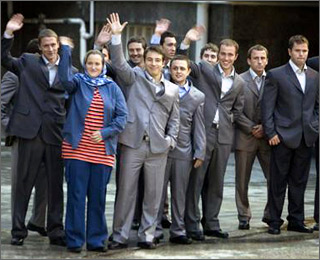
LONDON: Although the details of behind-the-scene negotiations that led to the release of Tehran’s arrest of 15 British naval personnel on March 23 remain unknown, the reason why the crisis was defused peacefully is obvious: Constrained by their respective domestic and external considerations, all the parties – Iran, Britain, US and Iraq – acted with restraint, and the affected parties were in direct contact, not least through their diplomatic missions in each other’s capitals. Later revelations about gross mistreatment of the sailors and threats during detention do not diminish the significance of the resolution of this crisis for other festering issues.
The satisfactory end result shows that direct talks between disputing countries is the best way to resolve contentious issues, especially when truculent states like North Korea and Iran are involved. The Bush administration ought to take note and act accordingly to settle its long-festering conflicts with the regime in Tehran. It is worth recalling that the bilateral talks between US negotiator Christopher Hill and his North Korean counterpart in January clinched a deal with Pyongyang on its nuclear program. Similarly direct talk between the British senior foreign affairs adviser and the secretary-general of Iran’s Supreme National Security Council proved an important step in defusing the latest crisis.
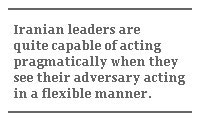
Another lesson to draw from the recent episode is that the Iranian leaders are quite capable of acting pragmatically when they see their adversary acting in a flexible manner. Conversely, when they encounter a confrontational stance, they respond in kind. This time, chastened by the experience of the four years of Iraq conflict and facing serious domestic challenges, British, American and Iranian leaders acted with circumspection.
To his credit, US President George W. Bush acted wisely by accepting the advice of British Prime Minister Tony Blair to keep a low profile on the Iran-UK dispute. Part of the reason for this convergence was both leaders’ awareness that escalation of tensions in the Gulf would lead to a sharp rise in oil prices, which would undermine the American economy in the throes of a collapse in the housing market.
On the other side, Iran’s Supreme Leader, Ayatollah Ali Khamenei, showed himself more open to counsel from his few foreign friends due to the isolated position his country finds itself at the United Nations Security Council on the nuclear issue. In this regard, President Bashar Assad of Syria, allied with Iran since the 1979 Islamic revolution, played a role by advising a quick end to the crisis.
As the ultimate arbiter of authority, Khamenei reportedly instructed Iranian President Mahmoud Ahmadinejad to refrain from jumping into Iran’s spat with a leading member of the US-led coalition in Iraq and inflaming the situation with incendiary statements. Ahmadinejad complied.
Currently, Ahmadinejad is politically vulnerable at home and knows it. His popularity is fading due to his failure to channel oil income into the pockets of the poor – the main plank of his election platform in June 2005.
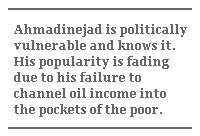
Contrary to the Bush administration’s routine description of Iran as a dictatorship and “an outpost of tyranny,” electoral considerations dominate the politics of the Islamic Republic. The country’s political calendar is peppered with elections to local councils, parliament, presidency and the Assembly of Experts. So, gaining or maintaining popularity remains the prime aim of politicians.
And, as in most other countries so in Iran, dialectical tension between moderates and hardliners – pragmatists and ideologues – is the main driving force of politics.
Among government bureaucracies, friction between foreign and defense ministries is commonplace, the former advocating diplomacy and the latter an iron fist. During the first Bush administration, the never-ending conflict between Secretary of State Colin Powell and Defense Secretary Donald Rumsfeld was an open secret. During Ronald Reagan’s presidency, Secretary of State George Shultz and Defense Secretary Caspar Weinberger were often at loggerheads.
Little wonder that the perspectives of Iran’s foreign ministry officials and the Islamic Revolutionary Guard Corps (IRGC) commanders, charged with safeguarding the country’s borders, vary widely.
In the Iranian-British spat, the input of foreign ministry officials was minimal in the beginning. The seizure of the British sailors occurred at a time when government offices were closed for the 10-day celebration of Iran’s New Year, starting March 21. By contrast, IRGC ranks and officers were on active duty throughout the holiday period. So their hard-line policy prevailed at the start.
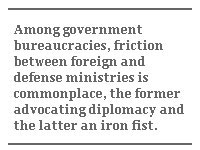
Significantly, the Iranian authorities aired the images and messages of the captured British sailors initially on Iran's Arabic satellite TV, Al Alam. By so doing, they conveyed to Iraqis as well as other Arabs in the Middle East that the Iranian armed forces were vigilantly guarding their country's borders on their own, whereas the Arab rulers had outsourced their defenses to the US and the UK by giving them land bases.
Iran’s initial hard-line stance was also a response to the threatening language uttered at first by Blair, followed by his attempt to internationalize the issue by getting the UN Security Council involved.
Later, listening to his Foreign Secretary Margaret Beckett, Blair realized that threats by foreign powers strengthen the hands of Iranian ideologues. So he changed tack.
He combined his spurning of Pentagon offers – ranging from buzzing Iran with its fighter jets to staging aggressive air patrols over its IRGC bases – with a request to the White House to stay out of the crisis and tone down its long-planned military exercises in the Gulf.
It was the 40-minute telephone conversation that Blair’s chief foreign affairs adviser, Sir Nigel Sheinwald, had with Ali Larijani, the secretary-general of Iran’s Supreme National Security Council, on April 3 that defused the crisis. Sir Nigel was told to wait until the end of Ahmadinejad’s press conference the next day to see “light at the end of the tunnel.”
All along the government of Iraq, whose territorial waters were at the root of the crisis, was discreetly silent. When Foreign Minister Hoshyar Zebari, an ethnic Kurd, finally spoke on April 3, he explained that he was working “intensively” to secure the release of the five Iranian officials – called the Irbil-5 – arrested by US troops in mid-January in Irbil, the regional capital of Iraqi Kurdistan.
Though the subject is of great importance to the Iranians and came up during their talks with the British, they refrained from linking the Irbil-5’s fate with the British sailors’ captivity. By so doing, they enabled the British and US governments to claim that they had not agreed to any swap of captives.
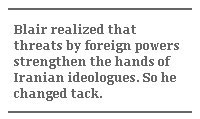
On the other hand, Rassoul Movahedian, the Iranian ambassador to Britain, said, “If they [the British] want to be helpful and use their influence [with Washington], we will welcome that.” He added, “We will welcome, in general, any steps that could defuse tensions in the region.”
Of course, defusing the growing tension over Iran’s bid to enrich uranium is much more complex and challenging a task than getting the release of British sailors from Iranian custody. But factors such as national pride, domestic political calculation and overseas reaction involved in resolving the hostage crisis are essentially the same in the nuclear issue as well. The question is, Will Tehran and Washington draw the right lesson from the latest episode, and seek fresh and innovative ways to find solution through direct talks?
Dilip Hiro is the author of “The Iranian Labyrinth,” and most recently “Blood of the Earth: The Battle for the World’s Vanishing Oil Resources,” both published by Nation Books, New York.